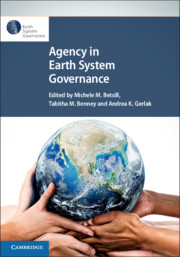Refine listing
Actions for selected content:
2285 results in Ebooks in ecology and environment
11 - Sustainability Issues in Urban Systems from a Metabolic Perspective
- from Part III - Perspectives on Urban Sustainability
-
-
- Book:
- Sustainability Assessment of Urban Systems
- Published online:
- 27 March 2020
- Print publication:
- 26 March 2020, pp 261-289
-
- Chapter
- Export citation
Contributors
-
- Book:
- Sustainability Assessment of Urban Systems
- Published online:
- 27 March 2020
- Print publication:
- 26 March 2020, pp xii-xvi
-
- Chapter
- Export citation

Agency in Earth System Governance
-
- Published online:
- 04 January 2020
- Print publication:
- 02 January 2020
Part Three - Policy Implications and the Future of Agency in Earth System Governance Research
-
- Book:
- Agency in Earth System Governance
- Published online:
- 04 January 2020
- Print publication:
- 02 January 2020, pp 181-197
-
- Chapter
- Export citation
Copyright page
-
- Book:
- Agency in Earth System Governance
- Published online:
- 04 January 2020
- Print publication:
- 02 January 2020, pp vi-vi
-
- Chapter
- Export citation
9 - Agency in a Multiscalar World
- from Part Two - Agency and the Dynamics of Earth System Governance
-
-
- Book:
- Agency in Earth System Governance
- Published online:
- 04 January 2020
- Print publication:
- 02 January 2020, pp 108-119
-
- Chapter
- Export citation
2 - Conceptualizing Agency and Agents in Earth System Governance
- from Part One - Introduction and Overview
-
-
- Book:
- Agency in Earth System Governance
- Published online:
- 04 January 2020
- Print publication:
- 02 January 2020, pp 25-37
-
- Chapter
- Export citation
Appendix - ESG–Agency Harvesting Database
-
- Book:
- Agency in Earth System Governance
- Published online:
- 04 January 2020
- Print publication:
- 02 January 2020, pp 198-226
-
- Chapter
- Export citation
11 - Agency in the Allocation of and Access to Natural Resources
- from Part Two - Agency and the Dynamics of Earth System Governance
-
-
- Book:
- Agency in Earth System Governance
- Published online:
- 04 January 2020
- Print publication:
- 02 January 2020, pp 131-142
-
- Chapter
- Export citation
Contributors
-
- Book:
- Agency in Earth System Governance
- Published online:
- 04 January 2020
- Print publication:
- 02 January 2020, pp ix-x
-
- Chapter
- Export citation
1 - Introduction: Agency in Earth System Governance
- from Part One - Introduction and Overview
-
-
- Book:
- Agency in Earth System Governance
- Published online:
- 04 January 2020
- Print publication:
- 02 January 2020, pp 3-24
-
- Chapter
- Export citation
13 - Accountability in the Governance of Global Change
- from Part Two - Agency and the Dynamics of Earth System Governance
-
-
- Book:
- Agency in Earth System Governance
- Published online:
- 04 January 2020
- Print publication:
- 02 January 2020, pp 155-167
-
- Chapter
- Export citation
4 - How Geographies and Issues Matter in ESG–Agency Research
- from Part One - Introduction and Overview
-
-
- Book:
- Agency in Earth System Governance
- Published online:
- 04 January 2020
- Print publication:
- 02 January 2020, pp 52-62
-
- Chapter
- Export citation
8 - Agency and Architecture: Producing Stability and Change
- from Part Two - Agency and the Dynamics of Earth System Governance
-
-
- Book:
- Agency in Earth System Governance
- Published online:
- 04 January 2020
- Print publication:
- 02 January 2020, pp 97-107
-
- Chapter
- Export citation
7 - Agency and Knowledge in Environmental Governance: A Thematic Review
- from Part Two - Agency and the Dynamics of Earth System Governance
-
-
- Book:
- Agency in Earth System Governance
- Published online:
- 04 January 2020
- Print publication:
- 02 January 2020, pp 86-96
-
- Chapter
- Export citation
Index
-
- Book:
- Agency in Earth System Governance
- Published online:
- 04 January 2020
- Print publication:
- 02 January 2020, pp 259-260
-
- Chapter
- Export citation
10 - Agency and Norms: Who Defines What Ought to Be?
- from Part Two - Agency and the Dynamics of Earth System Governance
-
-
- Book:
- Agency in Earth System Governance
- Published online:
- 04 January 2020
- Print publication:
- 02 January 2020, pp 120-130
-
- Chapter
- Export citation
3 - Theories and Methods of Agency Research in Earth System Governance
- from Part One - Introduction and Overview
-
-
- Book:
- Agency in Earth System Governance
- Published online:
- 04 January 2020
- Print publication:
- 02 January 2020, pp 38-51
-
- Chapter
- Export citation
6 - The Performance of Agency in Earth System Governance
- from Part Two - Agency and the Dynamics of Earth System Governance
-
-
- Book:
- Agency in Earth System Governance
- Published online:
- 04 January 2020
- Print publication:
- 02 January 2020, pp 73-85
-
- Chapter
- Export citation
Part Two - Agency and the Dynamics of Earth System Governance
-
- Book:
- Agency in Earth System Governance
- Published online:
- 04 January 2020
- Print publication:
- 02 January 2020, pp 63-180
-
- Chapter
- Export citation
